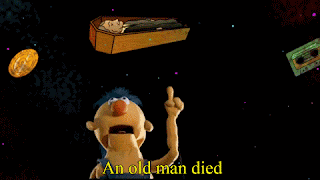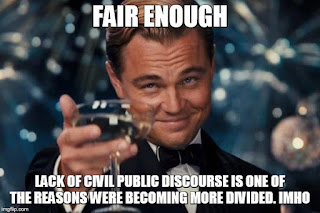A Future of Non-Combustible Ideas: The Ashes of Public Discourse in Fahrenheit 451
“You must understand that our civilization is so vast that we can’t have our minorities upset and stirred. Ask yourself, What do we want in this country, above all? People want to be happy, isn’t that right? Haven’t you heard it all your life? I want to be happy, people say. Well, aren’t they? Don’t we keep them moving, don’t we give them fun? That’s all we live for, isn’t it? For pleasure, for titillation? And you must admit our culture provides plenty of these.”-Captain Beatty, Pg 56
Among the plethora of dystopian
literature, there has been one title I’ve always found particularly
fascinating. Ray Bradbury’s Fahrenheit 451 envisions a future ruled by
entertainment and technology, where the written word and creative thinking have
been abolished in favor of harmonistic mental junk food. It seems to me that
this classic can’t ever seem to reach the same level recognition that George
Orwell’s prolific 1984 enjoys, which, honestly, is a crying shame. Fahrenheit
451 contains not only eerily accurate predictions of modern technology considering
it being written in the early 50’s, but a chilling portrayal of how this
technology and subsequently the entertainment it provides could contribute to a
future where public discourse is practically extinct.
The world of Fahrenheit 451 is vapid, shallow and concerned with nothing more than entertainment, so much so that it seems nearly impossible for most characters to use any amount of critical thinking or even engage in something as simple as empathy for a fellow human being. Everything is focused on experience, what feels and sounds good, disregarding the actuality of a situation.
The inhabitants of Fahrenheit 451’s setting are isolated from each other by the technology they rely on for entertainment. Nearly every household has an entire room decorated wall to wall with television screens where they can surround themselves with nothing but the dramatic nonsense and appealing adverts every day. The main character’s wife even refers to the characters on TV as a part of her family. Little earpieces, called Seashells, can play radio and music nonstop which only the listener can hear, eerily identical to earbuds in concept. They also block out any other sound, rendering it impossible for anyone with a Seashell in their ear to hear someone else trying to talk to them. So, not only do people surround themselves with media that seeks to control their conversation and present them with manipulated and dramatized portrayals of everyday life, but they are also literally unable to, at times, even hear one another through their own desire for constant amusement.
Perhaps the best summarization of this world’s dysfunctional mindset and its complete breakdown of public discourse is given by Captain Beatty, a fireman whose responsibility is to burn books now deemed contraband for their dangerous and “frivolous” concepts and ideas.
“Colored people don’t like Little Black Sambo. Burn it. White people don’t feel good about Uncle Tom’s Cabin. Burn it. Someone’s written a book on tobacco and cancer of the lungs? The cigarette people are weeping? Burn the book. Serenity, Montag. Peace, Montag. Take your fight outside. Better yet, into the incinerator. Funerals are unhappy and pagan? Eliminate them, too.” Pg 57
Why talk about what’s uncomfortable? Why try to understand what you don’t agree with? Why face an ugly truth or uncomfortable reality? The watering down of media and blatant censorship in Fahrenheit 451 creates an environment where there is nothing to talk about, no controversial topics to discuss. The media robs the people of their ability to think and speak for themselves by providing a constant supply of shallow content and meaningless drivel meant to isolate and manipulate. The television shows even mail scripts to viewers that they are supposed to recite at the right time in a show, even though the people on the television screen can’t hear them nor care. It’s akin to a children’s show along the lines of Dora the Explorer or Blue's Clues, where the audience has a perceived sense of participation, when in reality they have none at all. Except this is for full grown adults. Who should know better.
Beatty elaborates even further on the state of their society in what I think may be the most chilling and unsettlingly familiar description of this dystopian reality.
“You can’t build a house without nails and wood. If you don’t want a house built, hide the nails and wood. If you don’t want a man unhappy politically, don’t give him two sides to a question to worry him; give him one. Better yet, give him none. Let him forget there is such a thing as war. IF the government is inefficient, top-heavy, and tax-mad, better it be all those than that people worry over it. Peace, Montag. Give the people contests they win by remembering the words to more popular songs or the names of state capitals or how much corn in Iowa grew last year. Cram them full of non-combustible data, chock them so damned full of ‘facts’ they feel they’re stuffed, but absolutely ‘brilliant’ with information. Then they’ll feel they’re thinking, they’ll get a sense of motion without moving. And they’ll be happy, because facts of that sort don’t change. Don’t give them any slippery stuff like philosophy or sociology to tie things up with. That way lies melancholy.” Pg 59
When going back through my much beloved, and tragically disintegrating, copy of the book, Captain Beatty’s entire monologue to Montag is so eerily similar to issues we grapple with in modern society. From the media granting the public a “sense” of knowledge and control, to how entertainment can be used to water things down and distract from an issue, to how reliant we’ve all become upon technology to provide us with information we need to see or, alternatively, only want to see. I truly believe Fahrenheit 451’s grave predictions about the future of public discourse hits uncomfortably close to home. Which is good because that means we can talk about it.





Although I have never read "Fahrenheit 451" (I couldn't figure out how to italicize the title so please accept my wrong usage of quotations), I have heard about the odd accuracy that it has portrayed to today's society, despite, as it was pointed out, being written in a time where these technologies were not imaginable. The description that you gave of the book gave me a good idea as to how public discourse could be eliminated by such a society - a society that is very similar to ours today.
ReplyDeleteI remember when I first read "1984" I thought it was absurd. The idea of a government having that much control was odd to me, until I realized how easy it is for the media to create such a society. The ending quote from the character Beatty I think is the most impactful in the situation. If a person doesn't want to expose themselves to a new idea, why present them with more than one idea? It eliminates the entire side of debate, bringing an odd silence about. There is no need for shouting matches if everyone thinks the same. The concepts of books like "1984" and "Fahrenheit 451" may appear crazy on the first read through, but after many analyses, it is too easy to see how relatively similar our society is to these dystopian societies.
I also haven't read "Fahrenheit 451" (it's on my list) (and I also had to improperly use quotes, but disregard that)... BUT, reading that quote from page 57 about burning things kind of scared me. Censorship is *so* out of hand these days; people ban, burn, and bomb things they don't agree with. It's interesting to notice how we seem to be getting "less civil" in our discourse and open-mindedness as our society crawls toward its inevitable doom, when we pride ourselves on all these cool shiny things we can invent.
ReplyDeleteTech is totally turning us back into cavemen. When we disagree with something, we can choose to ignore it by closing a browser. We can filter what news we experience by our personal interest, so our society-so-dependent on social media is an interest-based sphere today, wherein we bargain and advertise our opinions. I personally blocked political news from my page for the last four years since that orange buffoon started to (publicly) spout countless crazy, sad excuses for political discourse than kids wielding water guns on a hot summer day.
I sure hope we can turn this around and just learn to care, even if we don't agree.
I will admit I'm a person that sometimes ignores the news because it's so depressing or upsetting. I know perfectly well that part of my duty as a citizen is to keep informed and updated, but sometimes it's just overwhelming (which is hardly an excuse but bear with me here).
ReplyDeleteI spend a lot of time around electronics and know what it feels like to delve deep into them and ignore the real world for a while. In that sense "Fahrenheit 451" is accurate in that people don't want to care about issues, they don't want to care about what's going on in the day to day.
Thankfully, though, I feel like there is a difference, however slight it may be. I'm admitting that I do this in the hopes that I can actually turn it around and try to participate more in what's going on in the world, even if participation is just having a meaningful discussion as opposed to "Did you hear about that? Yeah, it sucks. Anyways". I believe we as humans are not so far gone as to ignore what's going on completely, just that it seems so depressing and massive that talking about it feels futile and pointless. But it's not.
That's the whole point of public discourse: to speak about things that are happening and learn more about them and who we are in the process. I won't be going home and throwing away all of my electronics, but knowing when to unplug from entertainment and plug into the real world is a good start.
I have always found dystopian novels fascinating. While I have never read "Fahrenheit 451," I found your description on the novel interesting in that the story involves families surrounded by television screens. I feel as though this small bit from the novel correlates to the world today, just in a more exaggerated measure. In today’s world, smartphones, computers, and smart TVs take over our free time, as well as work hours. People that attend work and school are focused on their computer screens. At home, people retain news information through their televisions and phones. Smartphone owners become glued to their screens as they watch funny videos and post photos on social media. Perhaps we do not use screens as walls or constantly wear “Seashells” to block out outside noise, but we do watch TV and occasionally wear headphones to listen to music or a podcast. People are able to be conscious of the world around them and be able to have discussions with others.
ReplyDeleteI have never read "
ReplyDeleteI have never read "Fahrenheit 451," but after this blog post I am definitely adding it to my list. In reading your description, I can see the similarities between this piece of literature and today's world. You state that in the novel people are addicted to television, and in today's world I feel that addiction is for computers and technology. People use technology every day. I mean, we are using technology to communicate right now. However, I do feel as if people today can speak about controversial issues, unlike the society in "Fahrenheit 451." People today have an opinion on just about everything, and most are not afraid to voice that opinion.
ReplyDelete